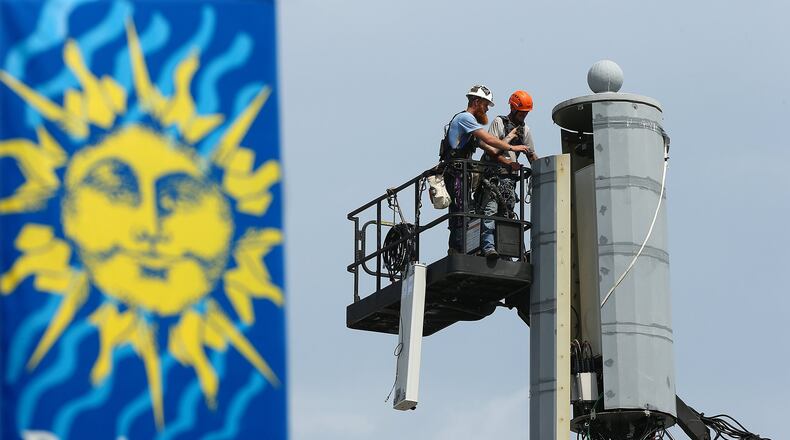To make way for faster wireless internet, Georgia lawmakers are pushing for statewide rules governing where and how cellphone companies can install their equipment on public land.
A Senate study committee voted unanimously last week to pursue statewide regulations to promote 5G wireless technology.
The committee’s recommendations will result in legislation to be considered by the Georgia General Assembly when it convenes next month.
If approved, communication companies such as AT&T and Verizon could gain access to public rights of way if they comply with statewide standards for pole height, permitting fees and equipment sizes. County and city governments would lose most of their authority to restrict companies’ use of public land for 5G equipment.
5G technology is roughly 10 times faster than cellphones on existing 4G networks, and it relies on installing small cells, which are wireless transmitters and receivers about the size of a mini-fridge.
“We hope that we can get broadband smeared all over Georgia at a much faster rate,” said state Sen. Frank Ginn, the chairman of the Senate Advanced Communications Technologies and Use of State and Local Government Right of Way Policy Modernization Committee.
Though state lawmakers have said they're focused on expanding internet access in rural Georgia, large cities will receive 5G service long before rural areas. Cellphone companies plan to eventually upgrade wireless networks nationwide.
Separate legislation will seek to subsidize rural internet construction by imposing a tax on streaming video, digital books and downloaded music. The proposed 4 percent communications service tax would cover digital goods and replace existing taxes on phone lines and cable TV.
Already, 22 states have passed laws to create regulations for small cell deployment, said Todd Edwards of the Association County Commissioners of Georgia, which represents the interests of county governments.
“We know the technology is coming, and we know (wireless companies) need the right of way,” Edwards said Thursday. “We think we’ve reached a reasonable compromise.”
Edwards said he’s concerned about a proposal forcing local governments to charge lower fees than the Georgia Department of Transportation for use of public rights of way. But he said he doesn’t object to the rest of the committee’s recommendations.
Details of upcoming legislation — such as the cost of permitting fees and equipment size limits — haven’t been revealed.
Similar proposals considered in this year’s legislative session didn’t pass, but lawmakers discussed poll height limits of 50 feet and small cell boxes no larger than 28 cubic feet.
AT&T has already announced it will include the Atlanta area in the first wave of its rollout of 5G wireless networks.
“We believe 5G will ultimately create a world of new economic opportunity, greater mobility, and smarter connectivity for individuals, businesses and society as a whole,” Melissa Arnoldi, AT&T’s president for technology and operations, said in a statement last summer.
Georgia 5G recommendations
A state Senate study committee is recommending that Georgia pursue the following proposals to promote 5G wireless technology during the upcoming legislative session:
- Promote 5G wireless internet service through uniform statewide fees and policies.
- Compensate local governments for their oversight of companies use of public rights of way.
- Review fees to use public rights of way and ensure they're based on actual costs incurred by governments.
- Encourage pole owners to negotiate with telecommunication and cable companies to allow placement of 5G technology on their poles.
- Require county and city governments to charge lower fees than the Georgia Department of Transportation for use of local rights of way.
Source: Final report of the Senate Advanced Communications Technologies and Use of State and Local Government Right of Way Policy Modernization Study Committee
Stay on top of what’s happening in Georgia government and politics at ajc.com/politics.
About the Author
Keep Reading
The Latest
Featured



